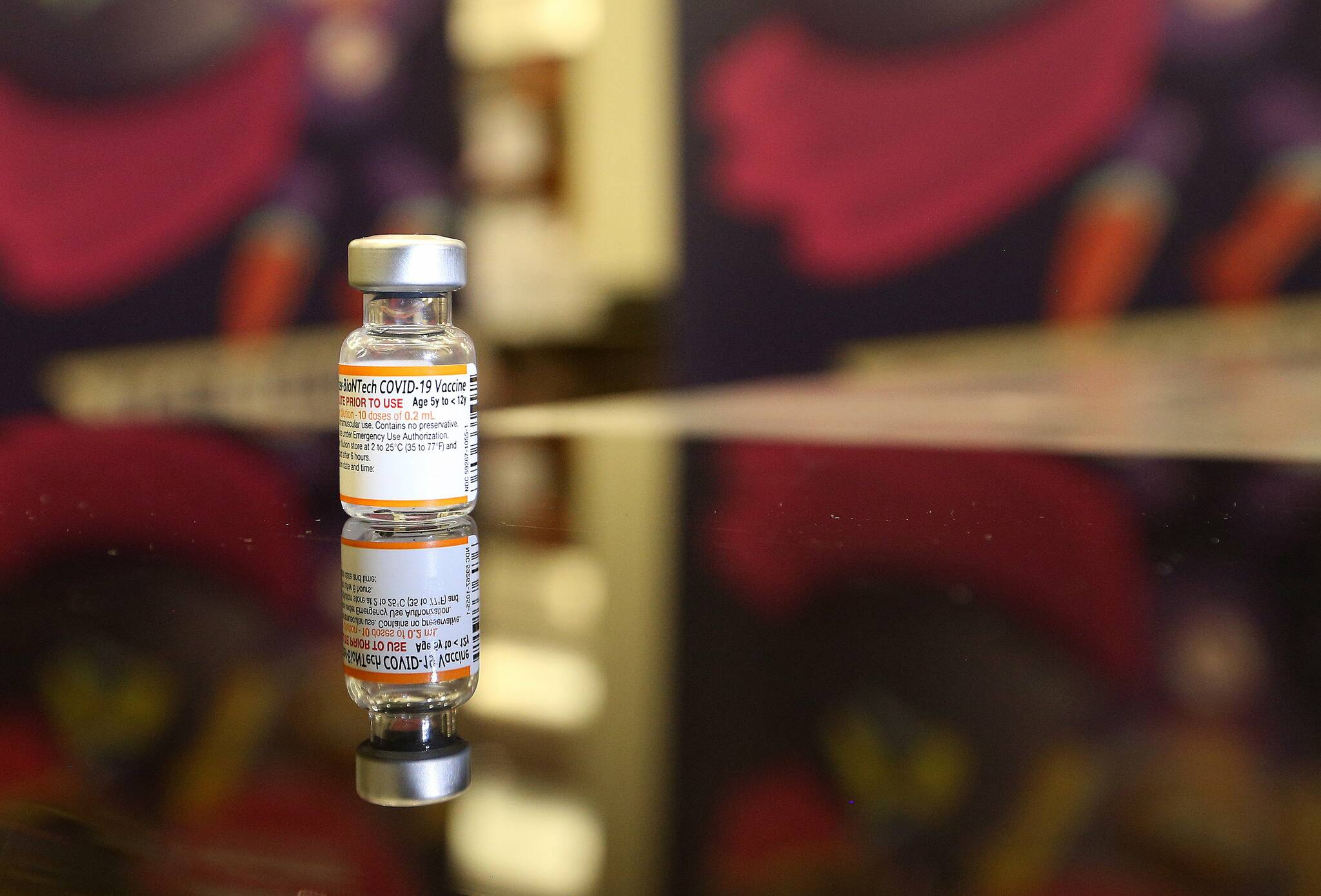By Moira Wyton, Local Journalism Initiative Reporter THE TYEE
More than 350,000 children aged five to 11 will be able to get their first COVID-19 vaccines as early as Monday, as vaccinations begin for newly vaccine-eligible kids across the British Columbia.
Every child in this age group will be offered a first dose by the end of January 2022, public health officials said during a press conference on Tuesday.
Invitations to book vaccines will be sent out to parents who have registered their children in the Get Vaccinated system in the order in which they signed up.
Parents may also call ImmunizeBC at 1-833-838-2323 to register their children or book an appointment over the phone.
Vaccination will help protect children, the largest unvaccinated demographic in the province, as well as suppress transmission of the virus as case rates continue to decrease steadily in B.C.
“We know that it’s important to protect kids individually,” said provincial health officer Dr. Bonnie Henry. “But it’s also important to allow children and families to get over some of the very severe disruptions of the pandemic we’ve had in our lives.”
“The vaccine also reduces that risk of transmission to children’s close contacts, particularly those who are older or at high risk of severe illness,” Henry added.
According to Henry, about 91,000 of 350,000 eligible children have been registered for vaccination so far.
A survey conducted by the province shows about 58 per cent of parents are ready to vaccinate their children right away, while an additional 18 per cent are considering it but need more time.
Children have slightly lower risks of severe illness and death from COVID-19 than adults but can still experience Long COVID and require hospitalization.
There have been 19 cases of multisystem inflammatory syndrome in children tied to COVID-19 in B.C., and 60 of the more than 15,000 infected five- to 11-year-olds have required hospital care.
Unvaccinated 12- to 17-year-olds are nearly 13 times more likely to be infected with COVID-19 than their vaccinated peers and are hospitalized at a rate of 37.3 per 100,000 individuals.
By contrast, no 12- to 17-year-old with either one or two vaccine doses has required hospitalization or died due to COVID-19.
Vaccination for kids “is important across the board,” said Henry. “No one wants children to get sick, even if the probability is that they will have a mild illness.”
The pediatric Pfizer vaccine has been fully reviewed and approved for use by Health Canada and was developed specifically with children’s stronger immune systems in mind, Henry said.
Each dose contains 10 micrograms of messenger RNA and has been shown to elicit an immune response in kids at least as strong as the 30 microgram doses approved for use in adults ages 12 and over.
There will be an eight-week interval between doses, a time frame the National Advisory Committee on Immunization has endorsed.
Based on clinical trial data and evidence from the more than three million children immunized so far in the United States, there is also a very low risk of any adverse events associated with taking the vaccine, including fever, headache or more serious outcomes like anaphylaxis.
In B.C., youth aged 12 to 17 in Canada have experienced 133 mostly mild adverse events as a result of vaccination. All 133 youth who experienced adverse effects recovered.
The risk of an adverse event is about 2.7 per 100,000, compared to the 37.3 per 100,000 rate of their unvaccinated peers being hospitalized.
“It is safe for use, and we can trust that in our children,” said Henry.
To receive their shots, children must have had their fifth birthday and either be accompanied by a parent or guardian who gives verbal consent or by another responsible adult who can provide written consent from the child’s parent or guardian. A child who turns 12 between doses will receive an adult dosage for their second shot.
The first shipment of doses arrived in Canada earlier this week and are to be distributed to clinics and communities across B.C. by next Monday.
The vaccine will be offered at a number of clinics across the province, including those tailored specifically to children and their families, who will be able to book multiple children’s appointments at the same time.
These settings include community health centres and, after-hours, at schools. COVID-19 vaccinations will not be offered at school during school hours in order to ensure that parents can attend appointments with their children.
Due to staffing limitations, vaccine lead Dr. Penny Ballem asked parents to book their children’s vaccine appointments ahead of time, rather than drop in — but said clinics will work to vaccinate all children and additional unvaccinated family members who come to a scheduled appointment.
Tuesday’s childhood vaccination announcement comes alongside evidence that exposures and transmission of the virus in schools is much lower in parts of the province with higher vaccination rates like Vancouver and Victoria.
So far, there have been 2,975 exposures in 830 schools in B.C. In total, there are 1,571 public schools and 365 independent schools across the province.
Fewer have had clusters, which imply at least two cases within 14 days where in-school transmission is likely. As of Nov. 6, B.C. had identified 38 clusters in 217 schools.
With the additional layer of protection soon available to young students, Henry says the data “tells us that what’s happening in the schools is working to support children.”
RELATED: B.C. kids 5-11 should have appointments for COVID-19 vaccination
RELATED: 45 per cent prepared to ditch social distancing at holiday gatherings: poll

